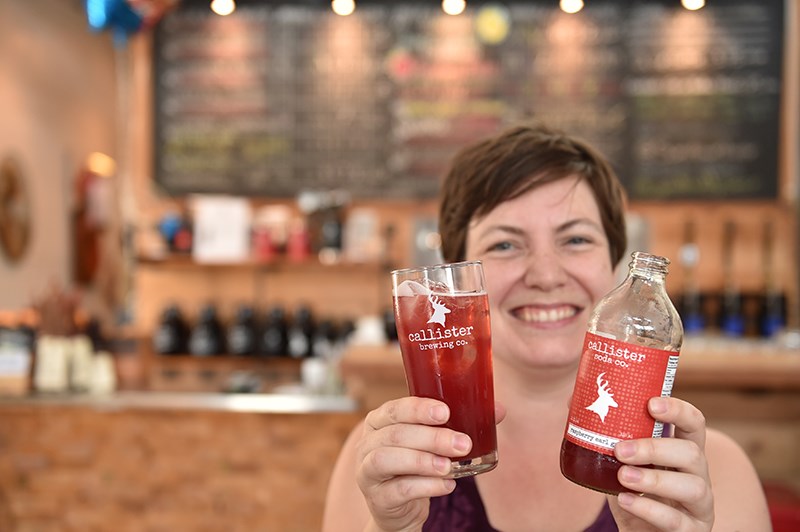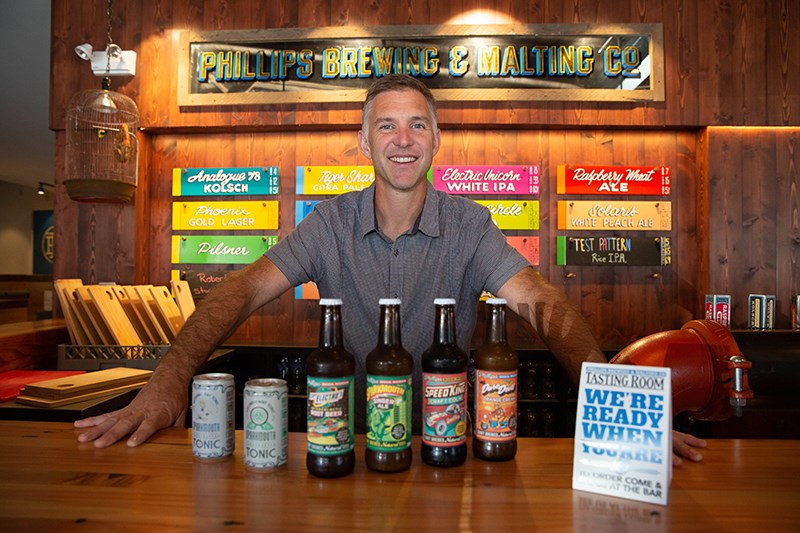For many B.C. brewers, their love of delicious beverages thankfully extends past beer. Some breweries have tried making ciders, others are doing whiskies and spirits. And some are going in a totally different, alcohol-free direction: soda pop.
And in the family-friendly tasting room, it’s proving to be a big hit.
Victoria’s Phillips Brewing and Malting Co. was the first B.C. craft brewery to try its hand at naturally brewed sodas, and six years later they can be found in grocery stores and restaurants all over the province.
However, the decision to get into the fizz biz came by accident, says founder Matt Phillips.
“We were looking at soda for inspiration for our beers,” he says. “We were playing with ginger and root beer spices, and it dawned on us that no one was making sodas from real ingredients.
“So we decided to.”
The result was Phillips Soda Works’ Capt. Electro’s Intergalactic Root Beer and Sparkmouth Ginger Ale, both launched in 2012. Phillips has since added a cola and an orange cream soda to the lineup, as well as the Phillips Fermentorium line of tonics.
Unlike what was on the market at the time, Phillips’ offerings were distinctly “craft.”
“Our sodas follow the same ethos as our beer,” says Phillips. “They’re made from scratch, from fresh ingredients and served fresh.”
Pop goes the (beer) world
Newly opened Loudmouth Brewing Company in Abbotsford has built soda into its business model since day one. Founder Nicolas Mielty says he wants to have craft options for everyone that walks through his doors, including those who don’t drink alcohol.
In addition to craft beer, Loudmouth’s tasting room also offers tall cans, 355mL bottles, 650mL bombers, growler fills and tasting flights of its hand-made all-natural sodas.
Mielty has been experimenting with soda pop for years and says he first fell in love with soda during a surfing trip to the U.S.
“You’d find these little pizza shops with amazing sodas in glass bottles,” he says. “But we just don’t have that selection here. I’d like to change that.”
Much of the Canadian craft soda market is dominated by foreign brands: retro craft sodas such as Lemmy’s, Dad’s, Moxie and Mr. Cola are all manufactured in Washington State, while Fentiman’s is imported from England. Even Jones Soda, which began in Vancouver, is now American owned and made.
Mielty says he’d like to see homegrown products take their place, and breweries are uniquely positioned to do just that.
“We have the mixing vessels, the CO2 tanks, the bottling lines, the pasteurization,” he says.
Loudmouth’s soda selection is diverse, with nitro cold brew coffee alongside craft cola and root beer. Mielty also plans to do a line of sodas inspired by craft beer, including sour fruit sodas, modeled after kettle soured ales, as well as dry-hopped pop.
“It’s actually pretty popular in Europe, but we haven’t seen it here,” he says.
There’s one thing you won’t find in his sodas, however: high fructose corn syrup.
“It’s astounding how much sugar is in some sodas,” he says. “You don’t need that much to sweeten it so [craft soda] is much better for you.”
Mixes and mashes

Callister Brewing’s Diana McKenzie says it was a similar interest in making beer that led her to make pop.
“Soda can be so much more than coke and root beer, much like the beer world has finally realized that beer isn’t just American lagers,” she says. “I want people to appreciate the possibilities and the range outside of big label commercial soda.”
Callister Soda offers flavours like Traditional Tonic, Raspberry Earl Grey, Ginger Mint and Spruce & Hop in 355ml bottles from the tasting room and other East Van retailers. The sodas are designed to be enjoyed on their own or used as a cocktail mixer.
“The Traditional Tonic is so different from what people think of as a tonic, so I have some very dedicated tonic followers,” says McKenzie. “The Raspberry Earl Grey gets people so excited,Ěýthey usually swear at me because it’s so good.”
There weren’t many resources available for learning how to make sodas, compared to homebrewing, McKenzie says, which meant a lot of experimentation was necessary to finally craft her unique recipes and scale them up for bottling. Since only a handful of companies are doing anything similar locally, there’s less industry support and collaboration than what she’s experienced in the brewing industry.
“I’ve had to figure it out on my own nearly every step of the way,” she says.
But being small and adaptable has its advantages: McKenzie can use fresh local ingredients, make small batches and sell theĚýsoda as fresh as possible.
“I’m sure most breweries could do it if they wanted to commit the resources to it,” she says, “but at a larger size and scale, it may require more of an investment.”
Unlike beer, however, soda can be enjoyed by everyone.
“You can sell it to anyone and anytime,” says McKenzie. “It’s actually really liberating not to be as restricted.”
For more beery adventures, go to
Ěý



